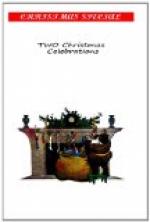In the time of David, many years before the birth of Jesus, the Hebrew nation had been very powerful and prosperous; afterwards there followed long periods of trouble and of war, civil and domestic; the union of the tribes was dissolved, and many calamities befell the people. In their times of trouble, religious men said, “God will raise us up a great king like David, to defend and deliver us from our enemies. He will set all things right.” For the Hebrews looked on David as the Americans on Washington, calling him a “man after God’s own heart,”—that is, thinking him “first in war, first in peace, and first in the hearts of his countrymen.” Sometimes they called this expected Deliverer, the messiah, that is the anointed one,—a term often applied to a king or other great man. Sometimes it was thought this or that special man, a king, or general, would be the Messiah, and deliver the nation from its trouble. Thus, it seems, that once it was declared that King Hezekiah would perform this duty; and indeed CRYUS, a foreigner, a king of Persia, was declared to be the messiah, the Anointed One. But, at other times, they, who declared the Deliverer would come, seem to have had no particular man in their mind, but felt sure that somebody would come. At length the expectation of a Messiah became quite common; it was a fixed fact in the public opinion. But some thought the Deliverer, the Redeemer, the second David, would be one thing, some another; just as men now call their favorite candidate for the presidency a second Washington; but some think he will be a Whig, and support the Fugitive Slave Bill; some, a Democrat, and favor the enslavement of Kansas; while others are sure he will be a Republican, and prohibit the extension of Slavery; while yet others look for some Anointed Politician to abolish that wicked institution clear out of the land.
When the nation was in great peril, the people said, “the Messiah will soon come and restore all things;” but probably they had no very definite notion about the Deliverer or the work he was to do.




